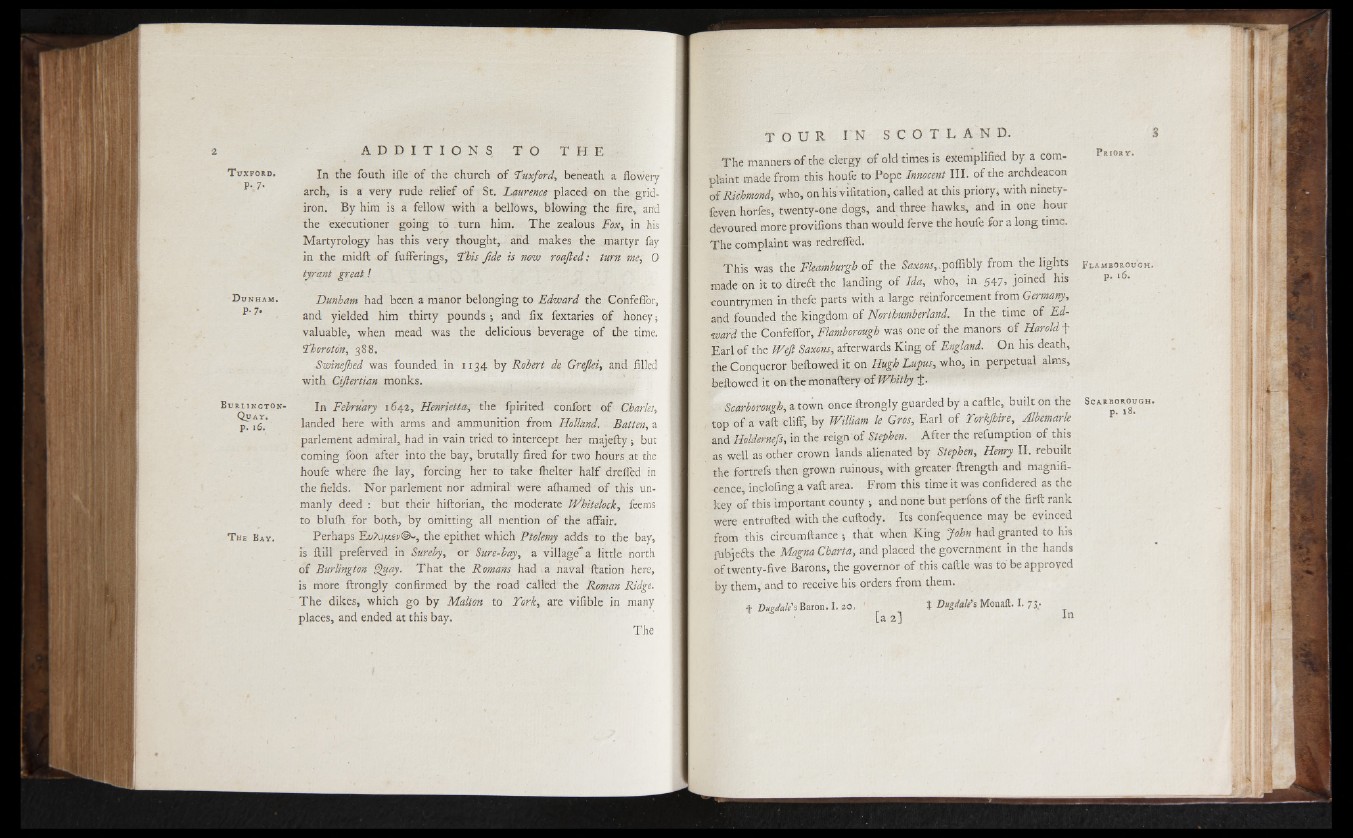
T u x f o r d .
P ‘, 7*
D u n h am.
p . 7.
B u r i i n g t o n -
Q u a y .
p . 16.
T he B a y .
In the fouth iile of the church of Tuxford, beneath a flowery
arch, is a very rude relief of St. Laurence placed on the gridiron.
By him is a fellow with a bellows, blowing the fire, and
the executioner going to turn him. The zealous Fox, in his
Martyrology has this very thought, and makes the martyr fay
in the midft -of fufferings, This ftde is now roafted: turn me, 0 tyrant great!
Dunham had been a manor belonging to Edward the Confeflor,
and yielded him thirty pounds •, and fix fextaries of honey;
valuable, when mead was the delicious beverage of the time.
Thorotón, 388.
Swinejhed was founded in 1134 by Robert de Grejlei, and filled
with Cijiertian monks.
In February 1642, Henrietta, the fpirited confort of Charles,
landed here with arms and ammunition from Holltmd. Batten, a
parlement admiral, had in vain tried to intercept her majefty; but
coming foon after into the bay, brutally fired for two hours at the
houfe where fhe lay, forcing her to take Ihelter half drefied in
the fields. Nor parlement nor admiral were alhamed of this unmanly
deed : but their hiftorian, the moderate Whitelock, feems
to blulh for both, by omitting all mention of the affair.
Perhaps EuA^er©-, the epithet which Ptolemy adds to the bay,
is ftill preferved in Sureby, or Sure-bay, a village'* a little north
of Burlington Quay. That the Romans had >a naval ftation here,
is more ftrongly confirmed by the road called the Roman Ridge.
The dikes, which go by Maltón to York, are vifible in many
places, and ended at this bay.
The
The manners of the clergy of old times is exemplified by a complaint
made from this houfe to Pope Innocent III. of the archdeacon
of Richmond, who, on his vifitation, called at this priory, with ninety-
feven horfes, twenty-one dogs, and three hawks, and in one hour
devoured more provifions than would ferve the houfe for a long time.
The complaint was redrefied.
This was the Fleamburgh of the S«<w,.pofiibly from the lights
made on it to direft the landing of Ida, who, in 547, joined his
countrymen in thefe parts with a large reinforcement from Germany,
and founded the kingdom of Northumberland. In the time of Edward
the Confeflor, Flamborough was one of the manors of Harold +
Earl of the Weft Saxons, afterwards King of England. On his death,
the Conqueror bellowed it on Hugh Lupus, who, in perpetual alms,
beftowed it on-the monaftery of Whitby f .
Scarborough, a town once ftrongly guarded by a caftle, built on the
top of a vaft cliff, by Wtttiam le Gros, Earl of Torkjhire, Albemarle
and Holdernefs, in the reign 'of Stephen. After the refumption of this
as well as other crown lands alienated by Stephen, Henry II. rebuilt
the fortrefs then grown ruinous, with greater ftrength and magnificence,
inclofing a vaft area. From this time it was confidered as the
key of this important county ; and none but perfons of the firft rank
were entrufted with the cuftody. Its confequence may be evinced
from this circumftance ; that when King John had granted to his
fubjefts the Magna Charta, and placed the government in the hands
of twenty-five Barons, the governor of this caftle was to be approved
by them, and to receive his orders from them.
f Dugdak's Baron. I . 20, ' t Dugdale’ s Monaft. I. 73.-
[a 2] 1°
F l am b o r o u g h .
p. 16.
S c a r b o r o u g h .
p. 18.